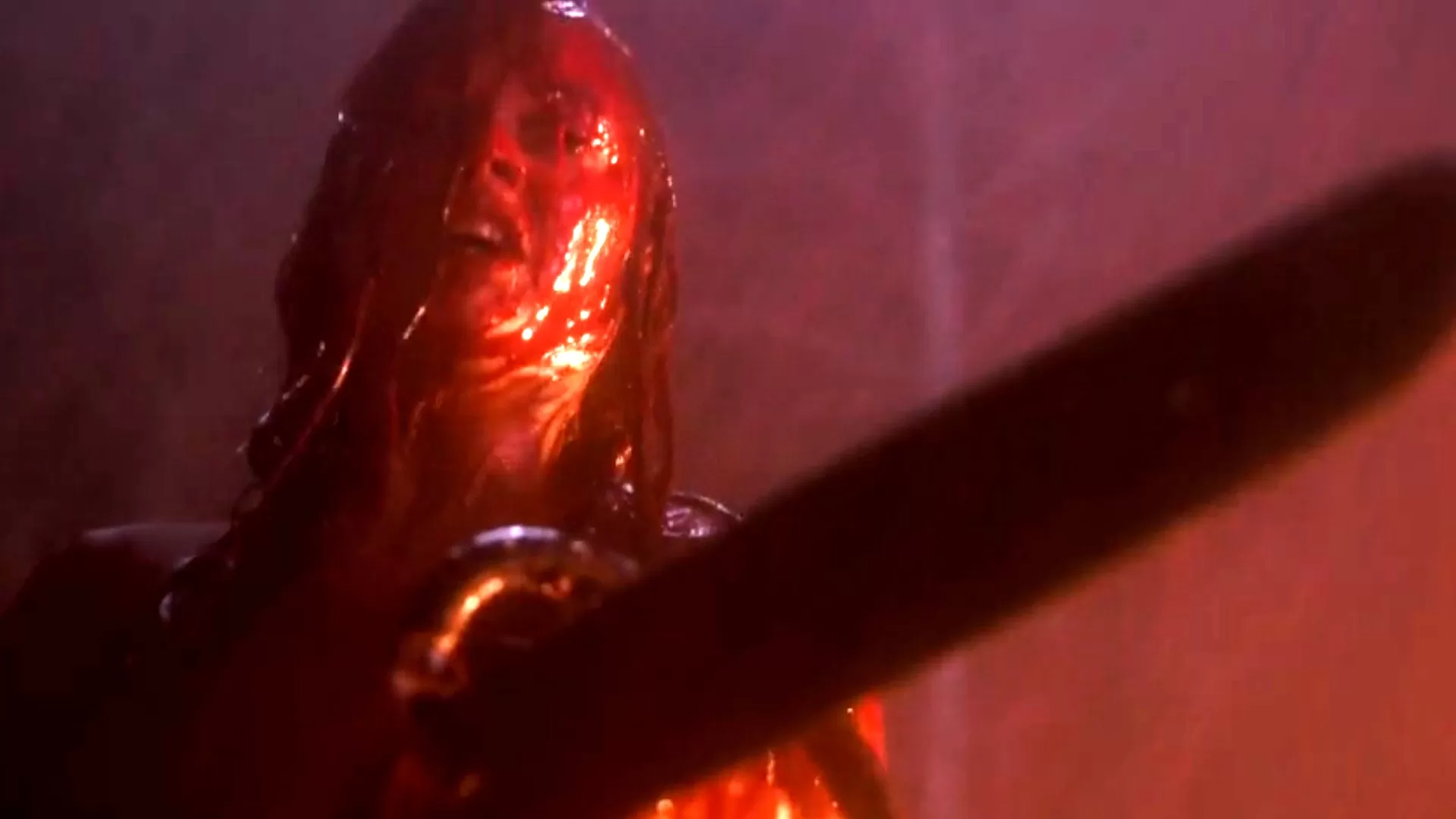Upon a somber eve, laden with storms and wrath, I dared to enter the dimmed refuge of a theater, where I was to submerge myself in the grisly tale of the 2013 film Evil Dead. Directed by Fede Álvarez, this gruesome reinterpretation of Sam Raimi’s 1981 masterpiece plunges its audience into an unyielding pit of dread, festooned with carnage, monstrosities, and despair. As I embarked on this sinister odyssey, I could not help but reflect on the connections between the film’s themes and Julius Evola’s ideas whilst at the same time unraveling its enigmatic undercurrents of feminism.
The story unfolds with a quintet of youthful individuals seeking solace in a secluded cabin hidden amidst the untamed wilderness. Inadvertently, they soon unearth a foreboding tome — the terrible Necronomicon. This unhallowed discovery unleashes malevolent forces from the chthonic depths, subjecting the hapless group to torments most unspeakable. The main character, Mia, a woman endowed with exceptional fortitude and determination, confronts the abhorrent demon that infests her and her comrades. In this portrayal of womanhood, we can discern a feminist assertion that encroaches upon the sanctity of established customs and social structure.
Mia’s harrowing voyage through terror incarnate epitomizes a rebellion against the natural order, endeavoring to undermine the divine principles that have presided over mankind since time immemorial. With unwavering resolve, she exorcises the evil spirit, emerging victorious and emancipated from conventional constraints. The film’s feminist motifs resonate with the alchemical transmutation delineated in Julius Evola’s philosophy — the ascent from the transitory and material to achieve spiritual enlightenment and self-mastery. Alas, in propagandizing gender equality, the film appears to transgress the boundaries of tradition and biological law, imperiling the very foundation upon which society stands.
As the narrative advances, the influence of Evola’s Traditionalist outlook becomes apparent. He perceived modernity as a degeneration of the sacred order, mirrored in the film by the desecration of the Lovecraftian manuscript and the subsequent unleashing of infernal forces. The protagonists are left to grapple with the consequences of their heedlessness and the decay of the spiritual realm, as the relentless horrors they face stand for the disintegration of contemporary society. The unwavering pursuit of feminist ideals within the film serves to further enfeeble the foundations of a world already tottering on the precipice of total disorder.
As the ghastly events intensify and reach their appalling zenith, Mia undergoes a disquieting metamorphosis. In a predictable homage to Bruce Campbell’s iconic character Ash from the original Evil Dead films, Mia seizes the formidable chainsaw and becomes a true avenger against the diabolic entity that has besieged her. This symbolic transformation defies the distinction between the genders and denies her innate feminine qualities, as she assumes both the power and determination typically attributed to male protagonists. By taking on the role of the hero, Mia shatters the constraints of gender roles imposed by society, emerging as a potent and unyielding enemy of the black void that seeks to devour her. The act of wielding the chainsaw signifies a call for the unification of the feminine and masculine, a merging that desecrates the esteemed concept of duality and heralds a new age of “liberty and deliverance” for all — a prospect most disconcerting for those who cling to the blessed principles of discipline forged from heritage.
In its impassioned quest to elevate the feminine above the masculine, the film appears to undermine the respected balance that has long maintained the eon-proof arrangement based on instinct. Mia’s assumption of the heroic mantle and her subsequent vanquishing of the nefarious being that has haunted her and her comrades is a direct challenge to the traditional roles and hierarchies that have long governed the realm of horror. By discarding the time-honored conventions of the genre, the film subverts the very essence of society, generating discord and strife in its wake.
Mia’s struggle against demonic possession is closely intertwined with her battle against substance abuse, itself a powerful representation of moral decay. In her trials, one perceives the reflection of the degenerate nature of modern society, which has thrown virtue and tradition into the dumpster, succumbing to the allure of base desires and the ephemeral enticements of materialism. The unyielding grip of drug addiction upon Mia serves as a woeful testament to the erosion of the venerated values that have long guided the West, leaving her susceptible to the insidious influence of the Satanic creature that attacks her. Her possession, in turn, signifies the inevitable descent into murkiness and chaos that awaits those who abandon the tenets of structure and convention in favor of the fleeting pleasures of a decadent existence.
Mia’s arduous journey of self-purification, as she overcomes the dual specters of dependency and unholy hijacking, exemplifies the Herculean effort required to reclaim one’s soul from the abyss of progressive madness. Amidst her ordeals, she must confront the innermost depths of her spirit, cleansing herself of the corrupting influences that have sought to engulf her. Her ultimate triumph over both her depraved lifestyle and the malignant forces that have tried to take hold of her embodies a fleeting glimmer of hope amidst the darkness of the tale, a testament to the indomitable human spirit that endures even in the face of insurmountable adversity.
Thus, with its peculiar amalgamation of the perspectives of Julius Evola and the essence of feminism, Evil Dead stands as a testament to the dangers of straying too far from the path of generational memory. In this chilling account of fear and defiance, we are indirectly asked to keep in mind the vital importance of upholding the holy equilibrium that has governed our world since prehistory and beware the looming dangers that threaten those who would dare to disturb it. For it is only through adherence to the ancient and immutable laws that we can truly maintain the harmony and stability that has nurtured us and our kin throughout the ages. In depicting a violation of these precepts, the film serves as a cautionary tale for those who might be tempted to follow the siren call of the liberal present and cast aside the anchors from the ages.
As I departed the theater, the echoes of the film’s horrifying scenes resonated within my brain, an unnerving signpost for the doom that lies hidden in the shadows of our world, ever ready to consume us should we choose to ignore the paramountcy of righteousness and true culture. The macabre tale of Evil Dead shall serve as an eternal warning to those who would forsake the wisdom of old and a poignant reminder of the solemn obligation we bear to maintain the delicate symmetry upon which our existence relies.










Remaking Evil Dead is bad enough… remaking it and ruining it even worse. What’s next remaking Army of Darkness with a trans lead? Total clown world.
I tell people Constantin von Hoffmeister is one of my favorite writers today. He 100% has the best nationalist substack. Now I have the article to point to as evidence. I am glad I have survived long enough to see “Evil Dead Evola” written! Brilliant work.